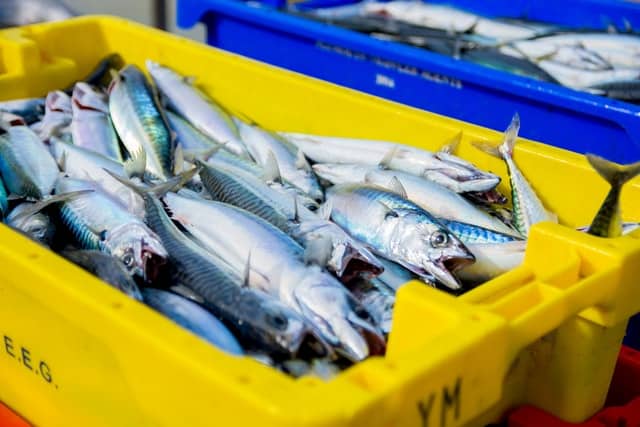Dog owners who want the best diet for their dogs sometimes try to find alternative food options. Fish, like mackerel, is one of the choices they consider. This makes one wonder, “can dogs eat mackerel?”
Many times the ingredient label of dog food indicates that it contains fish.
However, this does not mean that your dog can eat any fish. If you want to treat your dog with mackerel, here is what you need to know.
What is Mackerel?
For those who don’t know, mackerel is the name applied to quite a few different marine fish species, aka pelagic fish [1].
They are commonly found in warm and temperate waters, generally residing either offshore or on the ocean’s coastal waters.
Mackerel are bony fish with large triangular heads, short spines, and sharp, pointed fins. They have blunt heads, narrow mouths, and small nostrils that face backward.
To distinguish them from other types of fish, they have a series of barbs along their spine.
These barbs, located between each pair of dorsal fins, are the reason for their name. Mackerels also have short pectorals and a relatively long tongue.
Can Dogs Eat Mackerel – Short Answer

It may come as a surprise to some people that dogs can eat mackerel. Mackerel is one of the few fish that dogs can eat that won’t cause any harm to their digestive system.
It is an excellent source of protein, and the oil found in the flesh is also very nutritious for dogs.
Nonetheless, if you intend to feed your dog mackerel, there are certain things to consider. The way it is prepared when fresh, and the brand if it comes in a can.
You should also know what amount of mackerel is appropriate for your dog and be aware of allergic reactions.
Does The Nutrient Value Make Mackerel Okay For Dogs To Eat?
Mackerel is an excellent source of protein! Protein is what makes any meat nutritious for dogs. If you are not feeding your dog a lot of fresh meat, mackerel fish oil is an excellent substitute.
You can add some mackerel fish oil to his regular bowl of dog food.
Mackerel, whether fresh or canned, is packed with vitamin A. Vitamin A helps keep your dog healthy. With enough vitamin A, a dog can easily digest and absorb calcium.
However, too much calcium can cause flatulence and diarrhea. Therefore, one should never overdo it. Your dog needs just enough fresh mackerel to keep him healthy and well-adjusted.
Most fish, including mackerel, is a rich source of Omega-3 fatty acids. Omega-3 can help improve the skin of your dog, his coat, and it might even reduce shedding.
Since mackerel contains a high percentage of Omega-3 fatty acids, it also means that it is a lot more decadent. Therefore, moderation should be kept when serving mackerel to dogs.
One concern many dog owners have is the mercury level [2] in certain mackerel. Fish that are bigger tend to contain more mercury than smaller fish.
Therefore, if you want to feed your dog Mackerel, make sure you choose low-mercury fish. Chub and North Atlantic Mackerel are good examples of such fish.
Can Dogs Eat Canned Mackerel?

The short answer is yes. Dogs can eat canned mackerel! However, it is essential to know if your canines can be given mackerel in this form and how much.
Uncanned fresh mackerel is, of course, the healthiest to feed your dog. But canned mackerel can be just as good, as long as you pay attention to the ingredients on the label.
The first ingredient to note on the label should be protein. A high value of protein is a good sign that it is the right product for your dog.
Nevertheless, make sure that the can does not contain other ingredients or preservatives that might affect your dog.
Unfortunately, some commercial brands of canned mackerel contain preservatives. These preservatives can have adverse effects on your dog’s health.
The risk of cancers and liver disease can increase in dogs who are regularly fed artificial preservatives.
So stay away from these types of preservatives and choose a brand of canned mackerel without artificial additives.
It is always best to check with the veterinarian before feeding your dog a specific type of canned mackerel.
You can rest assured you introduce the right kind of canned mackerel to your dog by checking with your vet.
Can Dogs Eat Mackerel Bones?
Fishbones can be very healthy for dogs as they too contain high levels of protein, vitamin A, and calcium. They also contain omega-3 fatty acids, iron, zinc, and more.
However, unless you grind these bones into a powder, it is not recommended to feed them to your dog.
You might have heard of dogs that are fine after eating fish bones, but it’s better not to risk it. Mackerel bones are small, brittle, and therefore dangerous to feed a dog.
Fishbones can get stuck in the mouth, throat, stomach, and intestines of your pup. An incident like this can be painful to your dog, and it will require an expensive visit to the vet.
If you insist on getting the nutrients from mackerel bones into your dog, then consider grinding them. You can mix the bone powder in with their regular food.
Another option is to make mackerel-bone broth. Fish soup is rich in nutrients, minerals, and iodine.
While mackerel-bone soup should not be a replacement for his regular meal, it’s a nutritious addition to your dog’s diet.
You can also add broth to his traditional food. Just make sure to remove the bones from the liquid.
Can Dogs Have Mackerel In Olive Oil?
Olive oil, in general, is healthy for dogs to digest. It is an excellent source of monounsaturated fats, antioxidants, and omega-6 and omega-3 fatty acids.
Servings should be limited, though. About one teaspoon per pound of your dog’s weight per day should be the limit.
When it comes to serving your dog tinned mackerel in olive oil, the same rule counts. However, if you are not sure what other ingredients are in the olive oil-mackerel mixture, limit the intake.
In this way, you can see whether your dog has a negative response to the food.
How Much Mackerel Can A Dog Eat?
Now that you know the answer to: “can dogs eat mackerel?” Let’s discuss how much you should feed your dog.
In addition to a well-balanced diet, it is okay to add a healthy amount of fish to your dog’s diet. But keep in mind, too much of a good thing can also lead to problems.
In other words, too much fish, including mackerel, can cause obesity [3] in dogs. Plain, cooked, steamed, or grilled fish should be given to canines with some restraint.
Therefore it is essential to consult your vet about proper serving sizes of fish for your pup. This is particularly important if you plan to make mackerel part of your dog’s daily diet.
Dogs with a balanced dog food diet do not need additional nutrition unless the vet says so. Therefore, table scraps, including mackerel, are not required to keep your dog healthy.
However, mackerel can make a great occasional treat for your doggo.
Remember to keep an eye on your dog’s weight when feeding him human meals from time to time.
A good rule of thumb is to ensure that treats that include human food like mackerel only make up 10 percent of your dog’s daily intake.
What Are The Risks of Feeding Mackerel to Dogs

Mackerel itself is not harmful to dogs, but the way you prepare it can cause issues. It is important not to bake fish in too much oil as it can cause GI upset in dogs.
Dogs who ingest too much fatty food over time can develop illnesses such as pancreatitis [4].
Another thing to be aware of when preparing mackerel for your dog is the seasoning. Dogs do not need added flavors to natural food sources like fish.
Not even salt is necessary. Ingredients such as garlic and onions are toxic to dogs. Therefore one should never feed a dog Mackerel if these two seasonings were used.
Feeding your dog raw mackerel or mackerel with bones in it is also not recommended. While many dog owners ignore these precautions, it does not mean you should.
The risk of salmonella or a bone stuck in your dog’s throat will not be pleasant.
Read Also: Can Dogs Eat Truffle
Bottom Line
Mackerel, like most other fish, is excellent for dogs. Fish can provide your dog with many health benefits, and therefore, you can regularly feed mackerel to your dog.
Nevertheless, it is always important to introduce new foods gradually into a dog’s diet. Any signs of allergic reactions should be taken seriously by eliminating new foods from the diet immediately.
As long as you try to keep the mackerel meal as natural and fresh as possible, your dog should be just fine!
Mackerel is not only nutritious, but it is an exciting addition that can make mealtimes more enjoyable for your pup!
Read Next: Can Dogs Eat Horseradish

